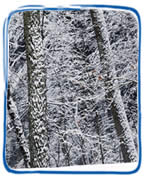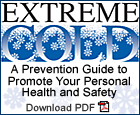About Winter Weather
Highlights
- You may have to cope with power failures and icy roads.
- Many homes will be too cold.
- Space heaters and fireplaces increase the risk of household fires and carbon monoxide poisoning.
- Exposure to cold temperature can cause other serious health problems.
- When temperatures drop below normal, heat can leave your body more rapidly.
When winter temperatures drop significantly below normal, staying warm and safe can become a challenge. Extremely cold temperatures often accompany a winter storm, so you may have to cope with power failures and icy roads.  Although staying indoors as much as possible can help reduce the risk of car crashes and falls on the ice, you may also face indoor hazards. Many homes will be too cold—either due to a power failure or because the heating system isn't adequate for the weather. When people must use space heaters and fireplaces to stay warm, the risk of household fires increases, as well as the risk of carbon monoxide poisoning.
Although staying indoors as much as possible can help reduce the risk of car crashes and falls on the ice, you may also face indoor hazards. Many homes will be too cold—either due to a power failure or because the heating system isn't adequate for the weather. When people must use space heaters and fireplaces to stay warm, the risk of household fires increases, as well as the risk of carbon monoxide poisoning.
Exposure to cold temperatures, whether indoors or outside, can cause other serious or life-threatening health problems. Infants and the elderly are particularly at risk, but anyone can be affected. To keep yourself and your family safe, you should know how to prevent cold-related health problems and what to do if a cold-weather health emergency arises.
The emergency procedures outlined here are not a substitute for training in first aid. However, these procedures will help you to know when to seek medical care and what to do until help becomes available.
What Is Extreme Cold?
What constitutes extreme cold and its effects can vary across different areas of the country. In regions relatively unaccustomed to winter weather, near freezing temperatures are considered “extreme cold.” Whenever temperatures drop decidedly below normal and as wind speed increases, heat can leave your body more rapidly. These weatherrelated conditions may lead to serious health problems. Extreme cold is a dangerous situation that can bring on health emergencies in susceptible people, such as those without shelter or who are stranded, or who live in a home that is poorly insulated or without heat.
- Page last updated December 7, 2007
- Content source: National Center for Environmental Health (NCEH)/Agency for Toxic Substances and Disease Registry (ATSDR), Coordinating Center for Environmental Health and Injury Prevention (CCEHIP)
Get email updates
To receive email updates about this page, enter your email address:
Contact Us:
- Centers for Disease Control and Prevention
1600 Clifton Rd
Atlanta, GA 30333 - 800-CDC-INFO
(800-232-4636)
TTY: (888) 232-6348
24 Hours/Every Day - cdcinfo@cdc.gov


